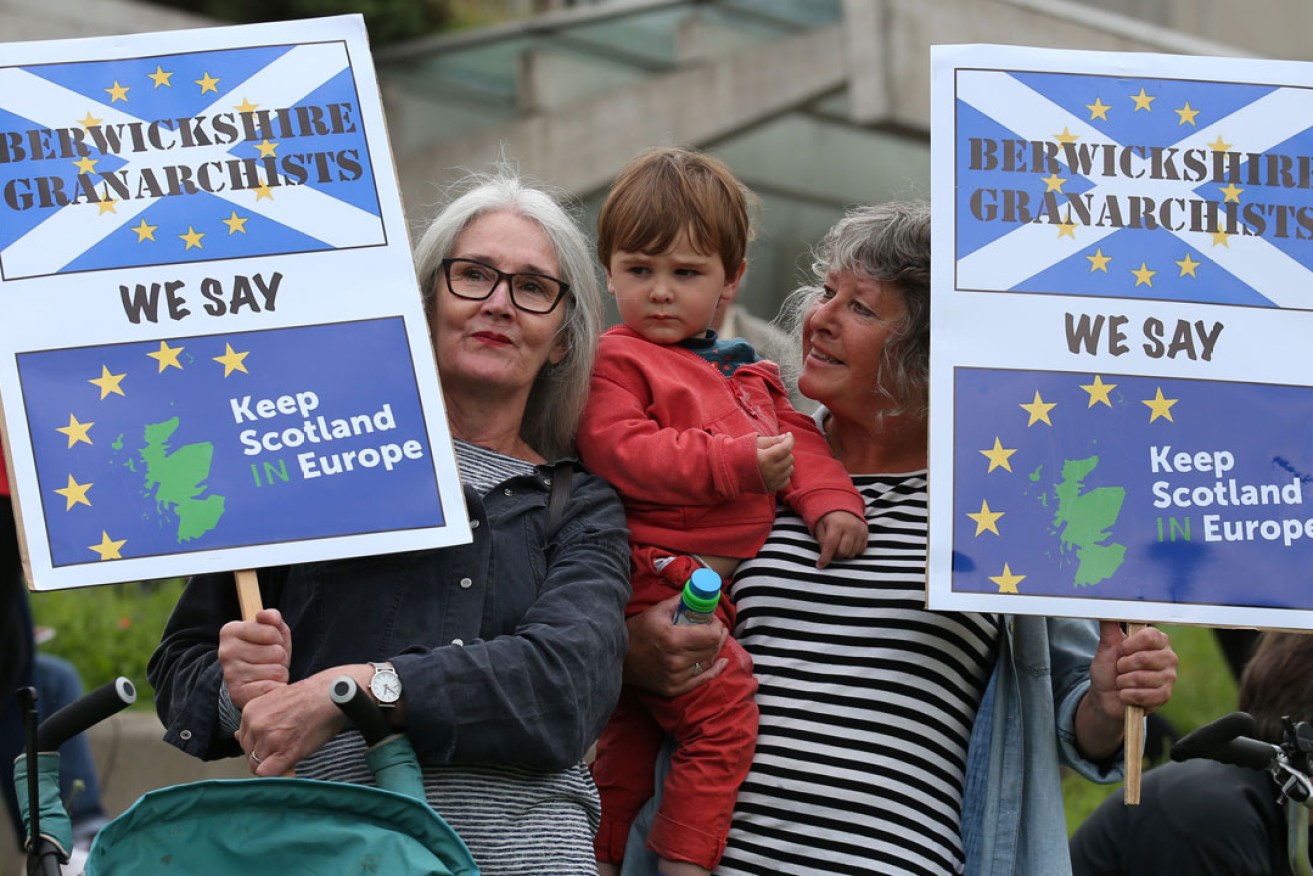Bridging the Brexit age gap
The great divide between the views of young and older generations revealed by Britain’s Brexit vote offers lessons for Australia about the risks of social alienation, writes COTA SA chief Jane Mussared.

Many older UK residents voted to leave the EU, but the majority of Scots - including these "Granarchists" - want to stay. Photo: PA
Analysis over the past week of the fallout of the Brexit vote in the UK has unearthed distinctive demographic voting patterns, revealing some surprising faultlines along which British society has assembled.
Nobody actually knows how anybody else voted in the Brexit poll. However, analysis of the voting outcomes at each booth, along with the results from the constant pre-polling which is now part of our political landscape, means that profiles of each of the “Remain” and “Leave” voters are emerging.
It has revealed a division between the views and behaviour of Britain’s youngest and oldest voters. Whereas young people overwhelmingly voted in favour of remaining in the European Union, the majority of older voters voted to exit.
The Brexit result spoke to the social alienation and broader isolation felt by many older Britons. Many seem to feel they do not truly “belong” to the EU. Nor do they believe it serves their interests or acts to assuage their concerns.
Older people were motivated to turn up to vote in very high proportions (upwards of 80 per cent), but fewer younger people did.
The post-poll analysis created a storm on social media, prompting accusations that older people, with fewer life years ahead of them, had robbed their youthful compatriots of their futures.
Whether or not Brexit turns out to be a catastrophe for both the UK and the global community is still to be seen. There is, however, a lesson to be learned about the differences that exist between generations.
From our vantage point in Australia, it is important that we take note so we can perhaps prevent the chasms that lurk beneath our civil society from erupting along our own faultlines – which, like the UK, go well beyond age to race, income, education and geography.
COTA (Council on the Ageing) SA has been very vocal about the unchecked ageism that exists in our community. We have also highlighted the risks of moving so much of the information and conversations that people require to make decisions to predominately online platforms. Indeed, there are many instances where businesses have begun to penalise people who are not able to manage their accounts online. These changes disproportionately affect older Australians.
More and more Australians manage their needs online because it is convenient and, from a business and government point of view, it is global, instant and cheaper. But whereas almost all teenagers use the internet, only half of those aged over 65 do, and even then their patterns of use are very different.
For those who do not, will not or cannot communicate proficiently online, the penalties and disenfranchisement they face are becoming ever deeper. They miss out on the information, conversations and opportunities that are increasingly accessible only online.
Simply put, as we rely more and more on online platforms to push out the information that people need to live, vote and participate, we run major risks of alienating swathes of older people.
Brexit would seem to be a lamentable outcome, not least for the UK. The outcome suggests that the people, the policy and the process were disconnected.
Blaming those who did their best to discharge their responsibilities in casting their vote fails to heed the deeper issues that led to the Brexit result.
We tend to live, work, play and discuss with our own kind. This is compounded by our modern habit of congregating age groups together to serve them, whether it is through retirement living, aged care or education.
To help dispel some of the effects of this isolation and group-think, we need to invest considerably more to assist older people to get online.
But we also need to create platforms that enable younger people to connect with older people offline. SA Premier Jay Weatherill’s modest but important experiment with Citizens’ Juries, for instance, is a step in the right direction. By bringing together different demographics to listen to and learn from each other, these platforms may protect us from seismic social divisions.
Brexit reminds us that we need to extend and enable opportunities for conversations across age and locational groups, and beyond cultural groups and socio-demographic clusters.
We need ways of bringing people from all walks of life together to learn, discuss and to mull over all sides of complex issues that ultimately affect all of us.
Jane Mussared is the chief executive of COTA SA, the state’s peak organisation for older Australians.




